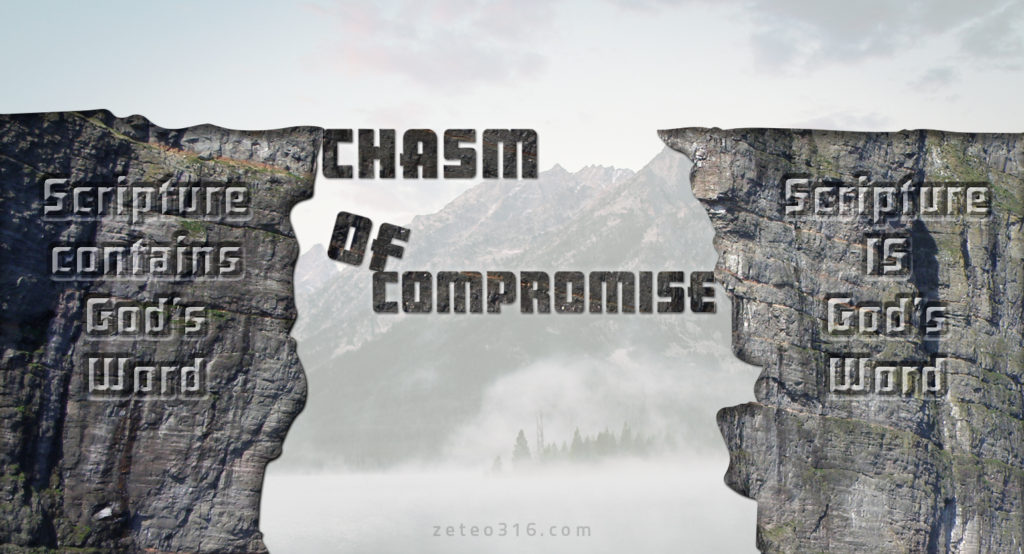Scripture Contains God’s Word?
The statement that Scripture Contains God’s Word sounds very reasonable at first blush. How could it not? After all Scripture does, indeed, contain God’s Word. But the problem isn’t that the statement is inherently false. The problem is associated with what the statement isn’t saying, and the inevitable consequences arising from its ambiguity.
The following information has been derived from a chapter of an essential book edited by John MacArthur, The Inerrant Word. (affiliate link) In chapter 10, Iain H. Murray discusses How Scotland Lost Her Hold on the Bible. It is subtitled A Case Study of Inerrancy Compromise.
I’m not going to too get deeply into Murray’s chapter. That would take many pages. But I do want to use his example of the compromising Church of Scotland to illustrate a problem the church has always faced. This is one I believe has become endemic. See my previous article Silly Putty Bible.
On page 162, Murray cites part of Article 1 of the constitution of the Church of Scotland:
The Church of Scotland adheres to the Scottish Reformation; receives the Word of God which is contained in the Scriptures of the old and New Testaments as its supreme rule of faith and life, and avows the fundamental doctrines of the Christian faith founded thereupon and contained in its own Confession. (Underlining mine)
Iain Murray asks how it was then possible that this doctrinal purity: “…descended to the level of permitting and upholding ministers who are practicing homosexuals?” How could the General Assembly allow what God had condemned? Murray explains that the articles of 1900 and 1921 were framed in such a way which allowed compromise to creep in.
He uses the example of a bag of groceries. You can tell someone that it contains potatoes. You might even mean that the bag ONLY contains potatoes. But you might also mean that it contains other items.
Likewise, the problem with saying that Scripture contains the Word of God is that it doesn’t affirm that Scripture is the Word of God. You may mean that it contains God’s Word, but also items which aren’t affirmed by the church, and thus open for debate. And this is exactly what has happened down to this day.
As far back as the 1890s J. C. Ryle argued against allowing this ambiguity. He said: “I hold that the Scripture not only contains the Word of God, but is the Word of God.” One outcome of this compromise was that it opened the way for the church to determine doctrine. Murray writes that because of this language ambiguity:
…Orthodoxy would no longer mean believing the Bible, but believing whatever the church told its people to believe.
So much for Sola Scriptura:
The whole counsel of God, concerning all things necessary for his own glory, man’s salvation, faith, and life, is either expressly set down in scripture, or by good and necessary consequence may be deduced from scripture: unto which nothing at any time is to be added, whether by new revelations of the Spirit, or traditions of men.” —Westminster Confession of Faith
Ambivalent language has been used on the mission field. The Chinese Church has rejected some western missionaries because of their scriptural compromise. It is an irony that these people were evangelized by faithful western Christians (e.g., Hudson Taylor); and now the western church needs to be evangelized by the Chinese!
Murray also provides the example of the island of Tangoa. It had been evangelized by faithful missionaries aided by the Presbyterian Church of New Zealand. But over time the NZ Church (under Scottish influence) became liberal, whereas the New Hebrides Christians held to the Bible. Because of this, the New Hebrides Christians sought independence from New Zealand. But the parent church refused to grant this independence unless the native Christians included in its constitution the words: “the Scriptures which contain the Word of God.”
J. Graham Miller, himself a New Zealander, protested that the words should be: “the Scriptures…which are the Word of God.” He was summarily overruled. The resulting conflict adversely affected the normally athletic Miller. However, he was able to rally and graphically make his case with the native Christians. He held up an old Bible and began ripping out its pages. This was what “contained in” meant.
In Murray’s words:
The native Christians saw something they were not to forget, and in 1949 their young church was brought back to the historic Christian belief in all Scripture as the Word of God.
It isn’t good enough to say that Scripture contains God’s Word. Such a statement invites compromise and heresy.
Let us all affirm that Scripture is God’s Word!

